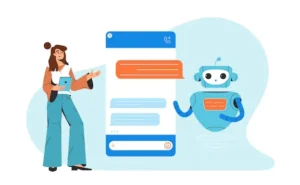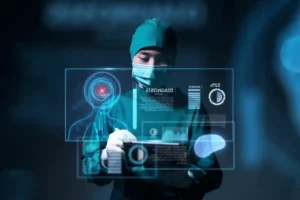How AI Is Shaping the Future of Work: The Role of Automation in Modern Industries
Artificial Intelligence (AI) is all around us today, and it’s transforming the way we work in significant ways. From robots assisting in factories to chatbots providing answers online, AI is simplifying many jobs, making them quicker and more efficient. One of the largest ways AI is affecting work is through automation, which is taking technology to perform tasks that human beings once performed. But how is AI transforming our careers and sectors, exactly? Let’s discuss it in a simplified manner!
What is AI and Automation?
- AI (Artificial Intelligence) means using machines or computer programs to do tasks that usually require human thinking, like making decisions or solving problems.
- Automation is when computers or computer software do repetitive things, so that people don’t have to anymore. It’s like having robots do the monotonous work while people can do more meaningful things.
How AI is Already Helping in the Workplace
AI is already making life easier in many industries. Here are some examples:
- Manufacturing: In factories, robots are doing tasks like assembling products, packaging, and checking quality. This helps businesses work faster and reduces mistakes.
- Customer Service: Have you ever talked to a chatbot when you need help on a website? AI helps with that! Chatbots can answer simple questions 24/7, saving time for customer service workers to deal with more difficult issues.


- Healthcare: Doctors are using AI to help with diagnoses, suggest treatments, and even perform surgeries. AI can quickly analyze medical data to make more accurate decisions.
4. Finance: In the banking world, AI helps with everything from detecting fraud to predicting stock prices. It can even recommend investment options based on your financial goals.
How AI and Automation Affect Jobs
A lot of people worry that AI will replace jobs. It’s true that some jobs may change, but it’s not all bad news. Here’s why:
- New Jobs: As AI grows, new types of jobs are popping up. People who can build, manage, and maintain AI systems are in high demand. Jobs in fields like data science and machine learning are becoming more common.
- More Creative Work: AI will be able to handle the mundane task so that humans can work on something more creative or complex. For instance, rather than dedicating time to sorting through information, employees can dedicate time to generating new ideas or developing products.
- Learning New Skills: With changing times, there’s a need to learn something new. Various firms are conducting training sessions so employees can gain knowledge to deal with AI so that they won’t be lagging behind.
Challenges of AI and Automation
While AI brings a lot of benefits, there are also some challenges:
- Job Changes: Some jobs may disappear or change because of AI. For example, tasks that were done by humans before might now be done by machines. But this also means people need to learn new skills to adapt to the changing job market.
- AI Bias: Sometimes AI can make mistakes. For instance, if an AI system isn’t programmed well, it could make biased decisions. It’s important for developers to fix these issues to ensure fairness.
- Economic Changes: Not all companies will be able to keep up with the costs of new technology. Smaller businesses might struggle with the switch to AI, which could lead to economic shifts.
What’s Next for AI in the Workplace?
The future looks bright for AI, and it’s only going to grow. Here are some things to expect in the coming years:
- AI Helping with Creativity: AI will start to help more in creative industries like design, art, and writing. It won’t replace creativity, but it will make tasks easier, such as generating ideas or editing content.
- Working with Robots: In other fields, human beings and robots will collaborate. For instance, robots can deal with hazardous jobs or heavy lifting while humans concentrate on decision-making and directing the operations.
- Remote Work Assistance: With more people working from home, AI will help manage remote teams, track work progress, and keep everyone on the same page.
Conclusion
AI and automation are revolutionizing the workplace in innovative ways. Some jobs might be altered, but new ones are also being developed. By utilizing AI to do repetitive work, we can release time for more engaging and creative tasks. The secret to maximizing the use of AI is for everyone to acquire new skills and adjust to these changes. As AI keeps improving, the future of work will be more intelligent, quicker, and more innovative—doing things we never imagined!
AI is not going to disappear, and if we utilize it in the right way, it can simplify our jobs and industries, making them more effective. The future of work is shaped very positively!
If you’re interested in learning more about how AI is reshaping the job market and creating new opportunities, check out this insightful article: How AI is Creating New Jobs.
For a deeper dive into AI’s impact on the future of work, watch the full video: How AI is Transforming the Workplace.

